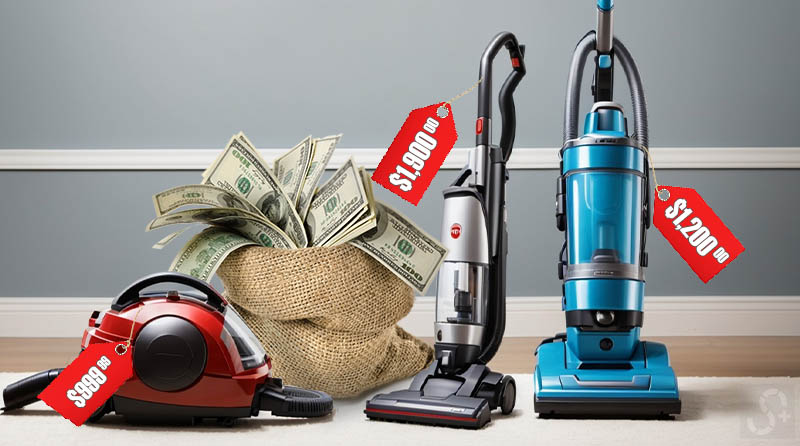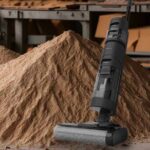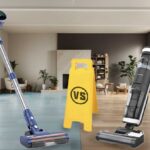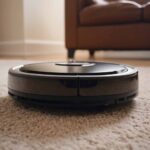I’ve bought many vacuums over the years and learned that what you’re willing to pay will dictate the vacuum’s performance.
Investing in a higher-quality vacuum cleaner might have a higher upfront cost, but it can lead to long-term savings by lasting longer and requiring fewer repairs or replacements.
Key Takeaways:
The most common factors that drive up the production cost of vacuums are items such as powerful motors, premium materials, and durable construction. In the long run, investing in a higher-priced vacuum often proves to be a cost-effective decision due to its longevity and superior cleaning capabilities.
Keep reading till the end to get a detailed breakdown of why vacuums are costly, are the expensive brand-name vacuums even worth it, how much should you pay for a vacuum, and more.
5 Reasons Why Premium Vacuums Cost More
High-Quality Material Usage
High-end vacuums often use high-quality materials that are made to last longer. On average, vacuums last about 6-8 years if properly maintained. Most expensive vacuums are made in a way to tolerate the wear and tear resulting from daily usage.
Premium Motor Quality
When comparing expensive and cheap vacuum cleaners, usually, high-end vacuums use good quality motors which leads to superior suction.
Since you are paying a higher price, manufacturing companies don’t tend to compromise on the technical specs of the products. They use high-quality motors that can stand the test of time and have minimal chances of failure, thus, justifying the high price tag.
Tip: If you use a cheap vacuum, you will potentially face gradual performance loss or even motor failure. But with premium models, you don’t have to worry about it as much, since advanced cooling technologies are used in the vacuum to manage the heat.
Top-Notch Filter Usage
Expensive vacuums often use high-quality filters and advanced technology to ensure better cleaning of the particulates. For instance, in the vacuum world, the Dyson brand is well-known for its premium models.
They use cyclone technology in their vacuums to effectively remove dirt particles. It works like this: High-speed air moves inside the vacuum, and from this circulating air, all the dust particles are efficiently captured by its filtration system. In a cheap vacuum, you can’t expect this level of filtration system.
Manufacturing Process With Strict Quality Control
Cheap vacuums are often mass-produced and quality control is often overlooked to meet the customer demand.
But with expensive vacuums, companies get quality time and the opportunity to invest more in the product, ensuring it is of top-notch quality.
Brand Value
Finally, brand value is another thing that raises the cost of any product including vacuums. It is a general perception that branded products need to be costly. And that high price means better quality.
Therefore, big and well-known vacuum brands may raise the prices of their products to make them look and feel premium. They do this to attract their target audience.
Companies who look to make genuine profits so that they can grow their business and invest more in advanced technologies and innovation.
It’s kind of like a cycle. Some brands make costly vacuums that allow them to make more profit. This allows them to make more investments in quality control and research. And that leads to better quality and innovative products for the end user.
As a result, consumers are attracted to buy more of such products because of the brand value, trust, and quality.
So these are some of the reasons why vacuums are so costly. Now let’s talk about the most important thing, how much should you spend on a vacuum.
What Price Should I Pay For My Vacuum?
You can pay for a vacuum based on your budget range and requirements. If you are a heavy user of vacuums, then going with a mid-range or high-range vacuum makes sense.
But if you have a limited budget and don’t mind quality control or brand value, then you can also go with entry-level vacuums.
Here’s a cost breakdown of vacuums based on their budget:
| Vacuum Type: | Price Range: |
| Entry-Level Vacuum | $100 – $200 or below |
| Mid-Range Vacuum | $250 – $500 |
| High-End Vacuum | $700 – $1000 or more |
Vacuum Cleaner: $100 – $200 Range
- Features:
- Basic functionality: Vacuum cleaners in this price range typically offer standard features such as suction power adjustment, bagless or bagged options, and basic attachments like crevice tools and dusting brushes.
- Weight: They are generally lightweight and easy to maneuver, making them suitable for small living spaces or apartments.
- Build Quality:
- Materials: The build quality might consist of a mix of plastic and some metal parts, which can be less durable compared to higher-priced models.
- Performance Benefits:
- Light-duty cleaning: These vacuums are suitable for light to moderate cleaning tasks, such as daily maintenance of floors, low-pile carpets, and hardwood surfaces.
- Affordability: The main advantage is the budget-friendly price, making them accessible to users on a tight budget.
Vacuum Cleaner: $250 – $500 Range
- Features:
- Enhanced functionality: Vacuums in this range often come with advanced features like HEPA filtration, multiple cleaning modes (e.g., carpet, hardwood, and pet-specific modes), and longer power cords.
- Attachments: They include a more comprehensive set of attachments, like motorized brush rolls for pet hair removal and upholstery tools.
- Build Quality:
- Sturdier construction: These models may feature more durable materials, such as reinforced plastics and metal components, contributing to better overall build quality.
- Improved design: The design and engineering tend to be more ergonomic and robust, offering better longevity.
- Performance Benefits:
- Versatility: They are suitable for a wider range of cleaning tasks, including deeper carpet cleaning, removing pet hair, and handling various floor types effectively.
- Longer lifespan: With improved build quality, they tend to last longer than the lower-priced models.
Vacuum Cleaner: $700 – $1000 Range
- Features:
- High-end functionality: Vacuums in this premium range come with top-of-the-line features, such as smart navigation technology, Wi-Fi connectivity, app integration, and advanced digital displays.
- Allergy and asthma-friendly: They often include the best HEPA filtration systems for capturing the smallest particles and allergens.
- Build Quality:
- Premium materials: These models are constructed with premium materials, including high-grade plastics, aluminum, and durable components.
- Advanced engineering: The engineering and design focus on maximizing efficiency and reducing maintenance requirements.
- Performance Benefits:
- Exceptional cleaning performance: These vacuums excel in deep cleaning carpets, hardwood floors, and other surfaces, leaving no trace of dirt or debris.
- Convenience and smart features: The integration of smart technology allows for hands-free operation and scheduling, making cleaning tasks effortless.
- Long-lasting investment: Premium vacuums offer superior performance, durability, and warranties, ensuring a long-lasting investment.
My Personal Experience with Expensive Vacuums
When I was young, I remember my Grandmother buying a vacuum for $3,500(I think it was a Kirby). The door-to-door sales guy really put on a show. He vacuumed up large metal balls to demonstrate the suction power, he vacuumed our sofa to show how much dirt he could pull out with just a few passes, and he even showed us large photos of the dust mites living in our homes.
He did one hell of a job selling a $3,500 vacuum. One thing I can say about that vacuum is that it’s built to last. 30 years later, that vacuum still works, and the suction power is phenomenal.
Are Expensive Vacuums Worth It?
Expensive vacuums are worth it if you are ready for the extra budget and have heavy cleaning needs. Expensive vacuums typically have powerful suction, robust build quality, and longer battery life which ensures a better cleaning experience.
Plus, they are often more lightweight models which makes them easy to carry and come with additional features that you may not find on the cheaper vacuum models.
Here’s an overview of some of the most expensive vacuum brands and the price range of their vacuums:
| Vacuum Brands: | Price Range: |
| Miele | $400 – $2000 |
| Dyson | $400 – $800 |
| Kirby | $500 – $1600 |
If you’re looking for a decent quality, budget-friendly vacuum, then go with Bissel or Shark brand vacuums. The cost of a Bissel vacuum starts from as low as $30 and ranges up to $250-$300.
Similarly, Shark is another well-known brand in the vacuum industry that offer good quality vacuums at a decent price range. The lowest price of the shark vacuum starts from as low as $70 and can range up to $400-$500 depending on the model type you purchase.
I know what you are thinking. Is it worth it to invest in expensive brands like Dyson vacuums than in Bissell or Shark?
Well, the answer to that question depends on two things: Your usage and budget.
When buying cheap or even mid-range products, you may have to keep in mind maintenance and replacement parts. But it’s not like a huge barrier.
The thing is when you buy expensive vacuums, you get quality products that tend to last long and have fewer maintenance-related issues. So if you have the budget for it, then it’s worth the investment.
Moreover, vacuums mostly last close to a decade, so you won’t have to worry about purchasing vacuums frequently once you purchase a quality and top-notch vacuum. Think of it just like investing in good quality Televisions which also have almost similar lifespans.
But if you have a tight budget, then don’t worry, it’s perfectly fine to go with mid-range vacuums from Shark or Bissell. They also offer decent quality and can also last long with proper maintenance and care.
By the way, are you looking for a vacuum to clean the baseboards of your room? Then don’t forget to check out my guide on recommended vacuums for cleaning baseboards.
10 Tips on How to Save Money When Buying a Vacuum Cleaner
Saving money when buying a vacuum cleaner involves strategic planning and considering various factors. Here are some tips to help you save money on your purchase:
- Research and Compare Prices: Take the time to research different vacuum cleaner models, their features, and prices. Compare prices from various retailers and online stores to find the best deals and discounts.
- Set a Budget: Determine your budget beforehand and stick to it. Avoid getting swayed by high-end features that may not be necessary for your cleaning needs.
- Consider Refurbished or Open-Box Models: Look for certified refurbished or open-box vacuum cleaners. These are often available at a discounted price while still being in excellent working condition.
- Look for Seasonal Sales and Promotions: Keep an eye out for sales events like Black Friday, Cyber Monday, or holiday promotions when retailers offer significant discounts on vacuum cleaners.
- Subscribe to Newsletters and Alerts: Sign up for newsletters or alerts from retailers to stay informed about upcoming sales, exclusive deals, or discount codes.
- Consider Last Year’s Models: Newer models often come with higher price tags, but the previous year’s models can still be effective and might be available at a reduced price.
- Buy Directly from Manufacturers: Sometimes, purchasing directly from the manufacturer’s website can offer better deals or exclusive discounts.
- Read Reviews and Seek Recommendations: Before making a purchase, read reviews from other customers and seek recommendations from friends or family who have experience with the specific vacuum cleaner you’re interested in.
- Check for Warranty and Return Policy: Ensure that the vacuum cleaner comes with a reasonable warranty and a favorable return policy in case of any issues.
- Buy secondhand vacuums from places like Facebook MarketPlace or Kijiji. Keep in mind you will sacrifice the warranty when buying secondhand. I tend to stick to premium high-end brands when buying second-hand. You’ll get better longevity from your product.
Does The Type Of Vacuum Affect Its Cost?
The type of vacuum you purchase can also have an effect on its price. Depending on your usage purpose, vacuums are available in mainly different types as follows:
- Corded Vacuums
- Cordless Vacuums
- Robot Vacuums
- Wet-And-Dry Vacuums
Robot vacuums are the most expensive type of vacuums. Of course, you can get them at $200-$300, but they are all entry-level. To get a high-quality robot vacuum, from name brands like Ecovacs or Roborock, you would have to spend about $1000 or more.
Speaking of robot vacuums, I highly recommend checking out this guide about what is the best robot vacuum brand. In it, I have given a detailed overview and analysis about robot vacuum brands so you can know which products are the right fit for you.
Then, the next type of vacuums that are on the costlier side include the cordless vacuum and the wet-and-dry vacuum.
The cordless vacuum offers a lightweight cleaning experience without the hassle of any cord. But they can quickly become expensive if you are expecting a cordless vacuum to match the performance of a corded vacuum.
Another drawback with cordless vacuums is they have restricted battery life and relatively less suction power. That said, if you are looking for a lightweight cleaning vacuum, especially for spot cleaning purposes, they are the best.
Finally, we have wet-and-dry vacuums. These vacuums can clean both wet and dry types of dust and spills, hence the name.
These vacuums tend to have high suction power and durable structure. They may not be lightweight and could also come at a relatively more expensive rate than entry-level upright corded or stick vacuums. But if you are looking for both liquid and dry spill cleaning, these vacuums are a perfect fit.
Why do different types of vacuum have different costs? Well, it’s because each type of vacuum is made with different levels of technology. The vacuum which is made with more advanced technologies and quality material, like robot vacuums, tends to cost more. Similarly, cordless vacuums are typically costlier than corded vacuums.
Conclusion
In short, vacuums are expensive due to reasons such as the use of material, durability, and quality control. If it is okay to go the extra mile with your budget and you prefer saving time in home cleaning tasks, then expensive vacuums are totally worth it.
But don’t expect too much difference between a decent quality mid-range vacuum and an expensive model.
If you have a tight budget and don’t need to vacuum a lot, then it would be a wise move to have a budget-friendly option that gives you more bang for your buck. The bottom line is, choose the vacuum based on your personal preference and needs.
FAQs
Why Are Dyson Vacuums So Expensive?
Dyson vacuums are expensive because they are one of the leading brands in the vacuum industry. They are known for creating high-quality vacuums that use top-class materials and innovative technology to give a nice vacuuming experience to their consumers.
What To Look For When Buying A Vacuum Cleaner?
The most essential factors to consider when buying a vacuum cleaner include suction power, noise level, and the design. However, there are also other factors to consider like filter, motor, brand, and the type of vacuum based on your needs.
Is It Good To Vacuum Every Day?
The general rule is to vacuum at least once or twice a week. Vacuuming every day is also fine if you have pets, or if your home tends to gather dust, frequently.








